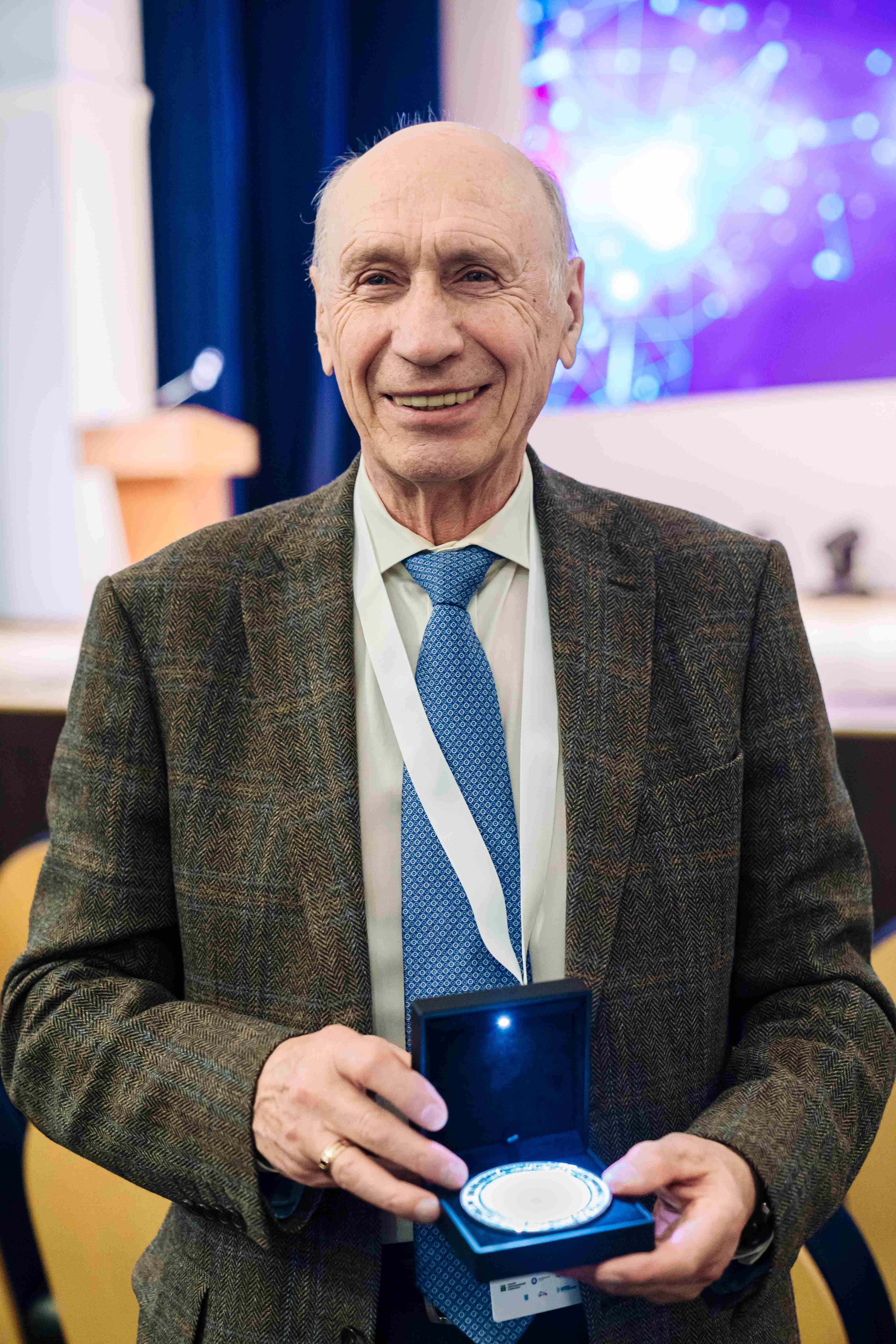On 2 October, 2025, within the framework of the International Conference “Neutron Scattering in Condensed Matter Research” (RNIKS-2025), a ceremony of awarding the Medal of the Russian Neutron Scattering Society (ROSNEUTRO) "For outstanding contribution to the development of neutron scattering" was held in Tomsk. This year, the Medal was awarded to the chief researcher at the Frank Laboratory of Neutron Physics of the Joint Institute for Nuclear Research (JINR, Dubna), Professor and RAS Corresponding Member Victor L. Aksenov.
Victor Aksenov is one of the leading specialists in Russia in the field of neutron research on condensed matter and a winner of the Russian Federation State Prize in Science and Technology for the development and implementation of new methods of structural time-of-flight neutron diffraction using pulsed and steady-state reactors. His research interests include condensed matter physics (magnetism of low-dimensional structures, complex liquids), neutron diffraction (neutron scattering, polarized neutron reflectometry), as well as neutron sources. Under him and with his direct involvement, a new research area in structural neutron diffraction - neutron Fourier time-of-flight diffraction was developed and a technique for studying layered nanostructures, that is neutron resonance reflectometry was proposed and developed.
Victor Aksenov’s scientific career started in 1973 at JINR, in the Bogolyubov Laboratory of Theoretical Physics. In 1989-1999, he was Director of FLNP JINR. Since 2000, he has been Head of the Department of Neutron Investigations of Condensed Matter at FLNP JINR. Since 2006, he has been Deputy Director of the National Research Centre “Kurchatov Institute” (NRC KI, Moscow), in 2012-2017, he was Director and Scientific Leader of the B.P. Konstantinov Petersburg Nuclear Physics Institute (NRC KI – PNPI, Gatchina), in 2017-2021, he was Assistant to the President of NRC KI and Scientific Leader of FLNP JINR. In 2012-2015, he was Member of the Presidential Council for Science and Education of the Russian Federation.
The major events in the history of Russian neutron diffraction are associated with the name of Victor Aksenov, including the development of basic techniques at the IBR-2 pulsed reactor of JINR, such as high-resolution Fourier diffractometry and polarized neutron reflectometry; establishment of a user neutron centre based on the IBR-2 reactor of JINR; modernization of the IBR-2 reactor of JINR; Russia's participation in the International Neutron Research Centre, the Institut Laue-Langevin (ILL, France); establishment of a research neutron centre based on the reactor PIK at the NRC KI - PNPI; as well as the organization of the Russian Neutron Scattering Society.
Victor Aksenov's scientific and organizational activities include: Vice-Chair of the Russian National Committee for Crystallography; Member of the Editorial Boards of RAS journals, as well as of several National and International Science Councils; the first representative of Russia on the Scientific Council of ILL (1997–2001); Chairman of the Programme Committees of International and National Conferences and Schools; Honorary Member of the Roland Eötvös Physical Society (Hungary) (1998).
Victor Aksenov was the first President of the Russian Neutron Scattering Society (2004–2006).
Victor Aksenov carries out extensive teaching activities, primarily, related to the training of young researchers to work in neutron research centres. From 1990 to 2000, a branch of the Department of Solid State Physics of MEPhI functioned in Dubna under him. He was the founder and head of the Neutron Diffraction Division at the Physics Faculty of Moscow State University (2000-2021). Twelve candidate and four doctoral theses have been defended under his supervision. Victor Aksenov is the author of several fundamental monographs, including the textbook "Fundamentals of Neutron Diffraction" (together with A. M. Balagurov, 2023).
Awarding of the ROSNEUTRO Medal "For outstanding contribution to the development of neutron scattering" to Victor Aksenov is distinct acknowledgement and recognition of the scientist by the Russian scientific community.
